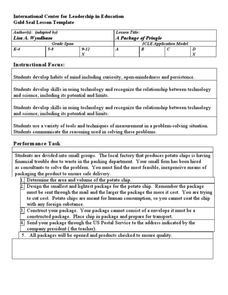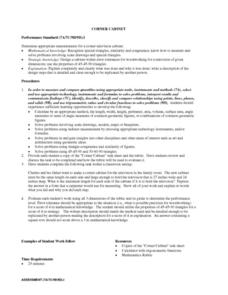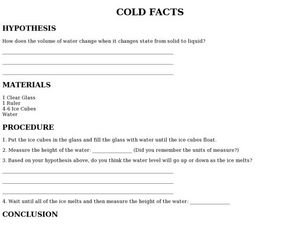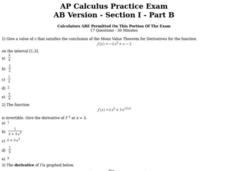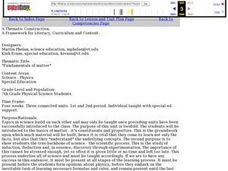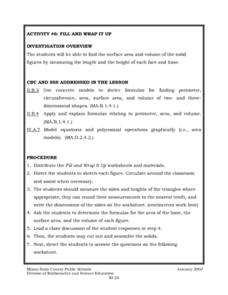Pennsylvania Department of Education
Volume of Compound Figures
Fifth graders use patterns, models and relationships to solve equations. In this equations instructional activity, 5th graders define vocabulary for equations and complete worksheets explaining variables and solving problems.
Curated OER
The Scientific Method
In this scientific method learning exercise, learners read over the basic steps of the scientific method and then apply those steps to a specific example. This learning exercise has 8 short answer questions.
Curated OER
More Density Graph Questions
In this density graph learning exercise, students graph data displayed in a chart. Students also calculate the density of each metal shown in the graph. Students answer questions about which detail is more dense.
Curated OER
A Package of Pringle
Here is a problem-solving instructional activity that has learners take the role of a packaging expert to design an inexpensive means of packaging a potato chip. It could benefit from having more specific detail about the instructional...
Curated OER
Metric Mania
Middle schoolers observe how to measure in metric units. In this investigative lesson students compare different units of volume to see how things are measured.
Curated OER
CORNER CABINET
Ninth and tenth graders calculate the length, width, height, perimeter, area, volume, surface area, angle measures or sums of angle measures of common geometric figures. They solve problems involving scale drawings, models, maps or...
Curated OER
Classification of Matter
This is a great learning exercise with an infographic to assist your students in categorizing matter into mixtures and non-mixtures. Information is given about the metric system of measurement. Your young students match 13 terms with...
Curated OER
Activity #19 The Density of Alka Seltzer Gas
Middle schoolers (teachers) complete the activity, they should not come in contact with Alka-Seltzer. They comprehend that the density of a gas can be calculated from its mass and volume. Pupils calculate the volume of gas generated by...
Curated OER
Wood Identification Based on Density
Eighth graders measure irregular and regular shaped solids. In this investigative lesson students calculator volume, mass and density of wood and blocks.
Curated OER
Making Sense of Density
Students identify the concepts of density, mass, and volume that define the property of a substance. They also determine that the properties of materials, such as, density and volume, can be compared and measured by using rulers,...
Curated OER
A World Of Matter
First graders complete a variety of experiments with solids, liquids and gases. They read books about matter, identify the characteristics of solids, liquids and gases and the sort and classify a variety of matter. Students make...
Curated OER
Determining Liquid Densities
Students practice determining liquid densities in a short, hands-on lab activity. Students use a graduated cylinder to measure out 100 milliliters of a liquid, find its mass using a balance, and record measurements in a data table....
Curated OER
Million Dollar Gift
Third graders create a box big enough to hold a million dollars. This is a project fun to do near the winter holidays with inexpensive gifts included in the boxes. This hands-on lesson plan very effectively demonstrates the concept of...
Curated OER
Science: Liquid Matter
Second graders examine the properties of liquids and their classifications. They compare and contrast cups of different liquids and record their findings in journals. Students observe how liquids flow at various speeds and that unlike...
Curated OER
Cold Facts
In this solid to liquid worksheet, students use ice cubes and water to see how the volume of water changes when solid water turns to liquid. Students follow 4 directions and answer 5 questions.
Curated OER
AP Calculus Practice Exam
In this Calculus activity, students are provided with practice problems for their exam. Topics covered include derivatives, area bounded by a curve, local maximum, instantaneous rate of change, and the volume of a solid of...
Curated OER
Surface Area of Prisms
Students calculate the surface area of different prisms. In this geometry lesson, students identify the shapes of solids based on the properties of that solid. They calculate the surface area using nets and properties of prisms.
Curated OER
Determining Mercantile Volume of a Pine Tree
Fourth graders, acting as foresters, determine timber volumes as sawtimber or pulpwood for marketing. They find the marketable value of a tree using its diameter and volume.
Curated OER
Fundamentals of Matter
Seventh graders explore the the constituents and properties of matter. They use the scientific process while exploring solids, liquids, gases, the mass, volume and density of matter. Students plan and conduct an investigation to measure...
Virginia Department of Education
The Particle Theory of Matter
Demonstrate the particle theory of matter to high school scientists with an engaging experiment that allows them to visually see the results as substances change from one state to another. The class concludes with a discussion about how...
Curated OER
Fill and Wrap It Up
Students find the surface area and volume of the solid figures by measuring the length and the height of each face and base. They use concrete models to derive formulas for finding perimeter, circumference, area, surface area, and volume...
Curated OER
Exploring Similarity Using Scale Drawings
Learners explore scale factor as they create a scale drawing of a box, then determine the surface area and volume of the original and the scale drawing. The one page worksheet contains activities and procedures with four questions....
Curated OER
Physical Changes and States of Matter
Fourth graders identify a physical change as one that results in a change in size, shape, or state of matter. After an initial teacher-led discussion and demonstration, groups of students get together to perform an experiment which...
Curated OER
Pacing a Gunther Chain
Students pace a Gunther Chain, a measurement used by foresters to determine distance and area. They discuss that pacing is individualized depending on age, gender, etc. They practice to find an average pace. Teams estimate, pace and...





